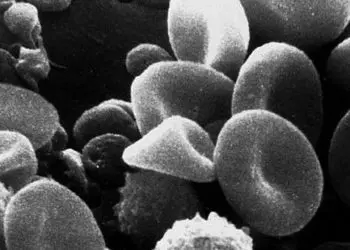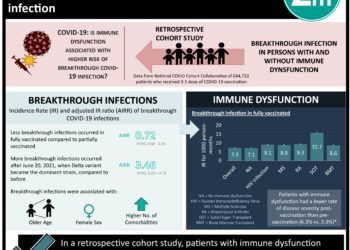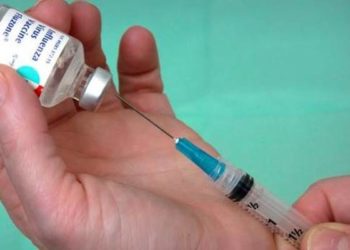Letermovir safe, effective in CMV prophylaxis following stem-cell transplantation
Image: PD/CDC
1. In recipients of allogeneic hematopoetic-cell transplants, letermovir was effective in reducing the incidence CMV infections in a dose dependent manner.
2. Treatment with letermovir was as safe as placebo, with no indication of hematologic toxicity or nephrotoxicity.
Evidence Rating Level: 1 (Excellent)
Study Rundown: Cytomegalovirus (CMV) disease, due to reactivation or new infection, is a severe and prevalent condition affecting immunosuppressed patients following stem-cell transplantation. Currently, standard of care involves preemptive therapy in which patients are monitored with PCR assays, and the administration of ganciclovir or valganciclovir in the setting of CMV viremia; however, these medications carry severe side effects, including bone marrow toxicity. Thus, there is a need for potent, safe drugs that can be used for CMV prophylaxis following stem-cell transplantation.
In this phase 2 randomized control study, the authors presented data on the efficacy and safety of letermovir, a novel inhibitor of a key enzymatic component of the terminase complex of CMV. Letermovir showed strong results in terms of efficacy, with a dose-dependent decrement of incidence of all-cause failure of prophylaxis in the letermovir groups. Furthermore, letermovir was found to be as safe as placebo in terms of side effects, including serious adverse events and events leading to study drug discontinuation.
Strengths of this study include its randomized placebo-controlled design, and the fact that it provides the necessary phase 2 clinical data for this study drug. There were discrepancies between testing for CMV activity in local study-site laboratories versus the central laboratory, reflecting varying sensitivities for these viral assays. Additionally, the study follow-up of 12 weeks does not provide longer-term data on the efficacy of letermovir in CMV prophylaxis.
Click to read the study, published today in NEJM
Click to read an accompanying editorial in NEJM
Relevant Reading: Cytomegalovirus in hematopoietic stem cell transplant recipients
In-Depth [randomized controlled trial]: This multicenter, randomized, double-blind, phase 2 clinical trial compared the efficacy and safety of increasing doses of letermovir versus placebo in prophylaxis against CMV viremia or disease after allogeneic hematopoietic-cell transplantation. Patients were adults who had received allogeneic stem cell transplants with evidence of engraftment; those who were CMV seropositive also had to have laboratory evidence of absence of active CMV replication prior to randomization. Use of other anti-CMV prophylaxis was prohibited, though treatment for HSV and VZV was permissible. The primary end points were incidence and time to onset of all-cause failure of prophylaxis against CMV infection (virologic failure or any other reason including adverse event, nonadherence, or withdrawal of consent) during the 12 weeks of study follow-up.
133 patients underwent randomization across 4 study arms: once-daily letermovir at a dose of 60mg, 120mg, or 240mg, or a matching placebo for 12 weeks. In an intention-to-treat analysis, the incidence of all-cause prophylaxis failure was significantly lower in the 120mg/240mg letermovir groups compared to placebo (32% and 29% vs 64%; P=0.01 and P=0.007 respectively); there was a dose-dependent decrement in incidence of the primary outcome across increasing doses of letermovir (6%, 19%, 21%, 36% across 60mg/120mg/240mg/placebo). The time to onset of prophylaxis failure was significantly shorter in the 240mg group compared to the placebo group (P=0.002 on log-rank test)—meaning that fewer individuals developed active CMV in the 240mg letermovir group but these were discovered earlier on. In a post hoc analysis, the authors showed that all of those who had failed treatment in the 240mg group had already had active CMV infection at time of randomization, though the local laboratory had not been sensitive enough to detect disease.
On safety analysis, patients on letermovir fared better than those on placebo: side effects considered to be drug related were lower in letermovir groups versus placebo (17% vs. 33%). Serious adverse events occurred more commonly in the placebo group versus letermobir (36% vs 31%); the same pattern emerged for discontinuation of drug due to adverse events.
More from this author: E. coli in mid-stream urine highly sensitive for cystitis, Oxantel pamoate results in higher cure rates of Trichuris trichiura in children, Hemicraniectomy improved survival but not functional status in MCA strokes, Broad decline in incidence rate of diabetes-related complications in US, Darapladib not effective in optimized, stable coronary heart disease patients
©2012-2014 2minutemedicine.com. All rights reserved. No works may be reproduced without expressed written consent from 2minutemedicine.com. Disclaimer: We present factual information directly from peer reviewed medical journals. No post should be construed as medical advice and is not intended as such by the authors, editors, staff or by 2minutemedicine.com. PLEASE SEE A HEALTHCARE PROVIDER IN YOUR AREA IF YOU SEEK MEDICAL ADVICE OF ANY SORT.







